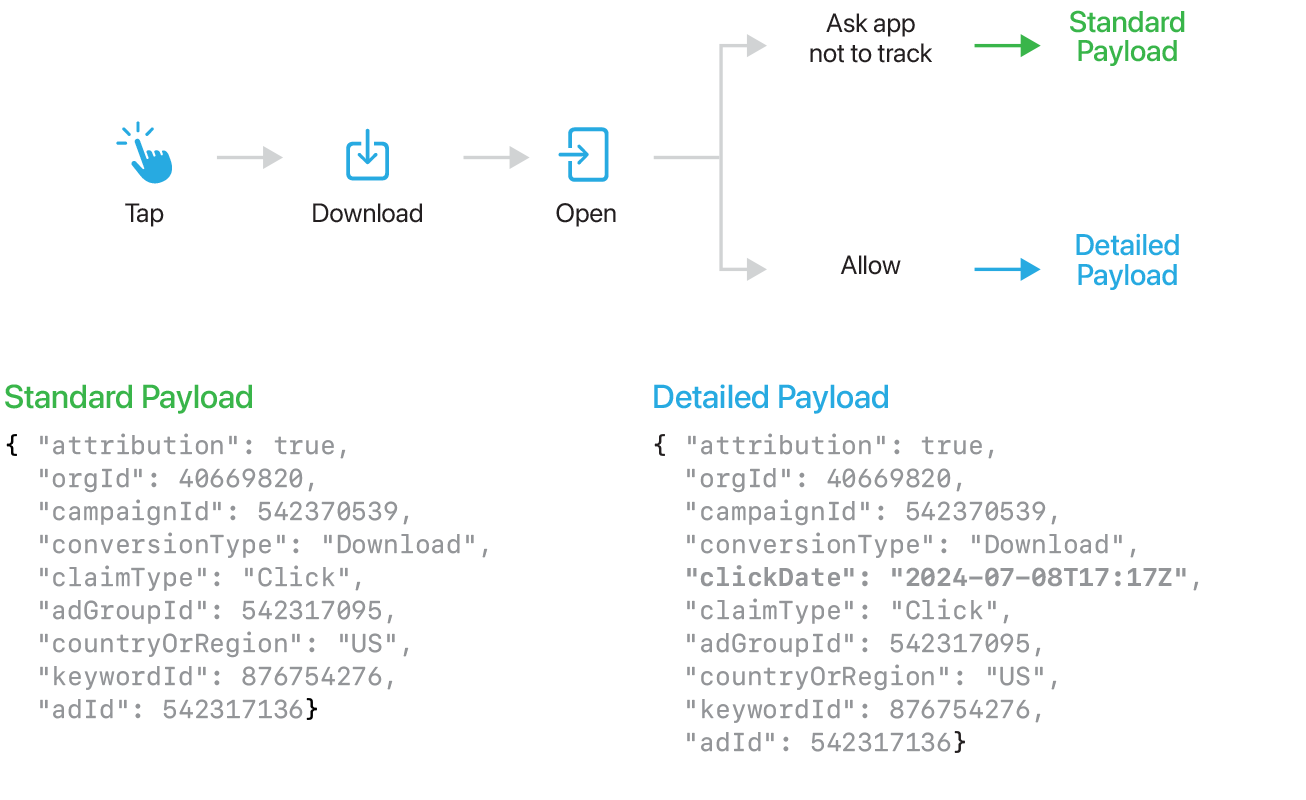Measuring performance of ads on the App Store
Following its registration with AdAttributionKit, Apple Ads customers are able to use two freely available and complementary methods for analyzing ad attribution while preserving user privacy: the AdServices attribution API, and measurement in AdAttributionKit.
Apple Ads registration
with AdAttributionKit
Apple Ads registered with AdAttributionKit on April 10, 2025 to provide a more comprehensive picture for its developer customers, so they can determine the app conversion and associated post-install activity that comes from running ads on the App Store. The same attribution logic applies to Apple Ads as is used for every other AdAttributionKit-registered ad platform.
With the registration of Apple Ads, AdAttributionKit expanded its scope of registered and known ad platforms, increasing visibility into user actions across even more marketing channels. This has helped AdAttributionKit more accurately attribute conversions to the last-clicked ad.
How to use AdAttributionKit to view attributed installs for Apple Ads
Apple Ads is currently registered with SKAdNetwork versions 1.0, 2.0, and 3.0 for click-through attribution. Apple Ads will register at a later date with the AdAttributionKit API.
Apple Ads is identifiable as “com.apple.ads”. Placements are mapped to the following campaign IDs:
- Search results = “10”
- Search tab = “20”
- Today tab = “30”
- Product pages = “40”
AdServices attribution API
The AdServices attribution API provides a privacy-centric solution that supports campaign, ad group, and keyword-level attribution. This attribution data can be used in addition to the data that is separately provided in AdAttributionKit, and it’s particularly valuable for smaller developers who may receive limited information back from AdAttributionKit due to its crowd anonymity thresholds.
How the AdServices attribution
API works
AdServices attributes app conversions for ads that run on the App Store that are created using Apple Ads. The AdServices attribution API only uses Apple’s first-party data and does not have information about whether or not a user viewed or clicked on an ad outside of the App Store.
AdServices sends attribution information to the advertiser when a user opens the advertised app, providing one of two sets of information — known as a payload. The payload returned is either “standard” or “detailed,” and both only provide information that does not identify a user or device. The difference between the two payloads is the clickDate or impressionDate field, which indicates the date that the ad was clicked on or viewed. The addition of clickDate or impressionDate in the detailed payload is sent only when user permission for tracking has been obtained by the app through the App Tracking Transparency (ATT) prompt.
Sample AdServices API payloads:

App Tracking Transparency (ATT)
Starting with iOS 14.5, developers are required to get user permission through the ATT framework to track user activity across other companies’ apps and websites and to access the Identifier For Advertising (IDFA). The ATT framework presents an app-tracking authorization request to users, with the options of “Ask App Not to Track” or “Allow” when they open an app.
Whether or not a developer seeks to track users is up to them. If they would like to track users (and access an IDFA), they are required to get explicit user permission through the App Tracking Transparency prompt. Apple, including the App Store, does not track users or use the IDFA for advertising, therefore the App Store app does not need to use the prompt. Just like the App Store, if others decide not to engage in tracking, they don’t need to use the ATT prompt.
AdServices attribution API
and privacy
In addition to the overall privacy safeguards Apple Ads has in place, the AdServices attribution API provides the following privacy safeguards:
- The attribution payload sent through the AdServices attribution API has limited granularity and does not explicitly identify a user or device. For example, the clickDate (which is only returned when user has opted into tracking via ATT for that specific app) is rounded to the minute.
- Different payloads are sent to the advertiser depending on the user’s choice of whether they ask the app not to track them through the ATT prompt. If a user asks an app not to track them, AdServices will return a standard payload without a clickDate or impressionDate. If a user allows an app to track them through the ATT prompt, AdServices will return a detailed payload, with a clickDate or impressionDate.
- The AdServices attribution API only uses Apple’s first-party data. Note that this may cause discrepancies with AdAttributionKit — for example, AdAttributionKit may be able to register a click from a third-party network that AdServices is, by design, unaware of, so both the third-party network and AdServices could claim the conversion in that instance. AdAttributionKit provides the official last-click amongst registered ad platforms.
Any advertising platform can provide supplemental attribution information based on the data they — as the platform owner — possess.